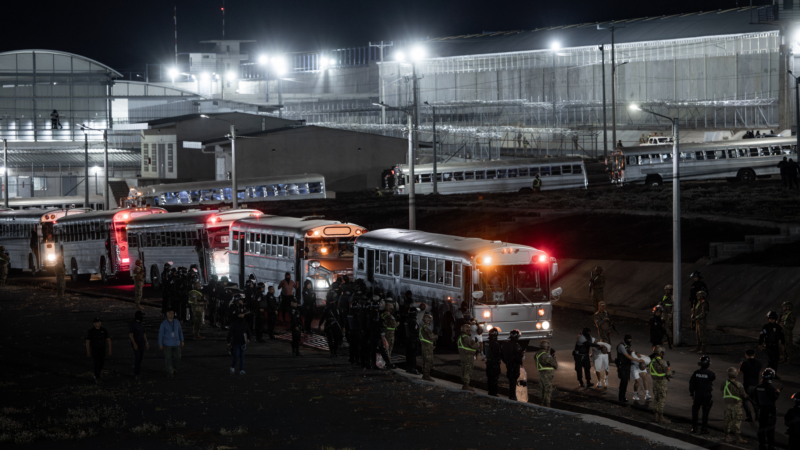Court hearing to test legality of deportations under 18th century law
Government lawyers are expected back in court on Friday to debate the legality of President Trump’s proclamation of the Alien Enemies Act.
Trump invoked the 1798 law last weekend to target members of Tren de Aragua, a Venezuelan prison gang he says is invading the U.S.
Judge James Boasberg, a federal district judge in Washington, D.C., blocked immediate deportations under the law in response to a lawsuit brought by immigrant rights groups, and ordered the government to turn around any planes already in the air. But three flights of more than 250 people deported from the U.S. still ended up in El Salvador the same evening.
Friday’s hearing over the merits of Boasberg’s temporary restraining order comes as the case has become a flashpoint between the judiciary and executive branches, with some Republican officials accusing Boasberg of overreach and calling for his impeachment.
Boasberg has questioned the government over whether the flights of detainees to El Salvador defied his order.
And for a week, the administration has declined to provide all the information he requested about the flights.
In a legal filing on Thursday afternoon, Boasberg called the government’s latest response to whether it had violated his judicial order “woefully insufficient” and said the government “again evaded its obligations.”
The Justice Department, meanwhile, says “the court’s superfluous questioning of sensitive national security information is inappropriate judicial overreach.”
While Friday’s hearing is about the underlying case, questions about compliance with Boasberg’s orders could come up as well.
Court filings escalate
White House press secretary Karoline Leavitt earlier this week provided a breakdown of the 261 people on the three flights, saying 137 were deported under the Alien Enemies Act, 101 were Venezuelans deported under regular immigration proceedings, and 23 were members of the MS-13 gang.
It is unclear which of the three planes carried the 137 alleged Tren de Aragua members.
And the Justice Department has so far declined to provide all the details the judge requested.
In an emergency filing on Wednesday, for example, lawyers wrote that the case has “devolved into a picayune dispute over the micromanagement of immaterial fact finding,” and warned it could open the door to “unnecessary judicial fishing expeditions.”
In a separate appeal to the D.C. Circuit, the Justice Department also requested that Boasberg be removed from the case.
In the meantime, lawyers told Boasberg that the administration is evaluating “whether to invoke the state secrets privilege” with regard to the flight details the court wants, they said. Such a privilege allows executive branch officials to refuse to provide evidence in a court case if they say it could harm national security or foreign relations.
Boasberg on Thursday gave lawyers until Friday morning to provide more details about the administration’s discussions on using the state-secrets privilege, and to make a final declaration on whether they’re going to invoke the privilege of state secrets by March 25. He also asked the government, yet again, to explain why the two flights that departed on March 15 did not violate his emergency block on deportations under the Alien Enemies Act.
Trump attacks Boasberg directly
Trump himself called Boasberg a “radical left” judge and “a lunatic,” suggesting during an interview with Fox News’ Laura Ingraham earlier this week that he was looking for publicity.
“We have bad judges — we have very bad judges — and these are judges that shouldn’t be allowed. I think at a certain point you have to start looking at what do you do when you have a rogue judge?” Trump said.
Trump also posted on Truth Social about how the “crooked judges” acting against him on immigration should be impeached, in what appeared to be a reference to Boasberg.
White House Deputy Chief of Staff Stephen Miller told reporters on Wednesday the administration as a whole stands by Trump’s comments about Boasberg.
“You cannot have a democracy where single, individual district court judges can assume the full, total powers of the commander in chief,” Miller said.
New York Giants hire John Harbaugh as coach after identifying him as their top choice
Harbaugh joins the Giants 11 days after he was fired by the Baltimore Ravens. The Super Bowl champion is now tasked with turning around a beleaguered franchise.
US launches new retaliatory strike in Syria, killing leader tied to deadly Islamic State ambush
A third round of retaliatory strikes by the U.S. in Syria has resulted in the death of an Al-Qaeda-affiliated leader, said U.S. Central Command.
NASA rolls out Artemis II craft ahead of crewed lunar orbit
Mission Artemis plans to send Americans to the moon for the first time since the Nixon administration.
Trump says 8 EU countries to be charged 10% tariff for opposing US control of Greenland
In a post on social media, Trump said a 10% tariff will take effect on Feb. 1, and will climb to 25% on June 1 if a deal is not in place for the United States to purchase Greenland.
‘Not for sale’: massive protest in Copenhagen against Trump’s desire to acquire Greenland
Thousands of people rallied in Copenhagen to push back on President Trump's rhetoric that the U.S. should acquire Greenland.
Uganda’s longtime leader declared winner in disputed vote
Museveni claims victory in Uganda's contested election as opposition leader Bobi Wine goes into hiding amid chaos, violence and accusations of fraud.






